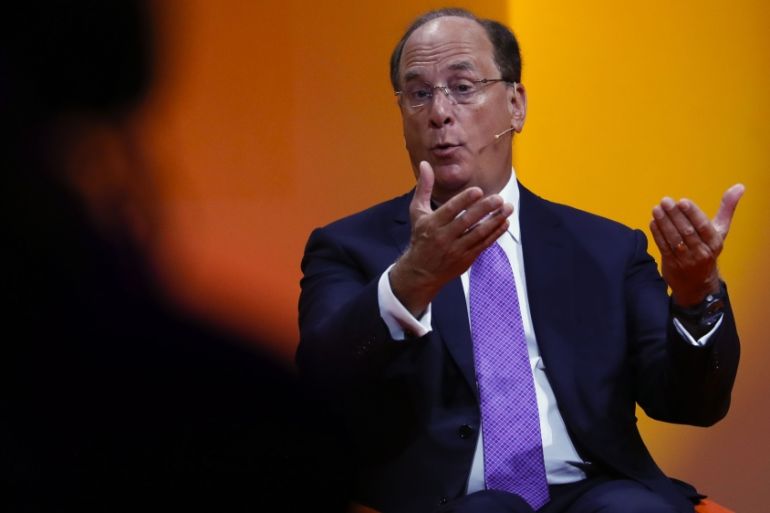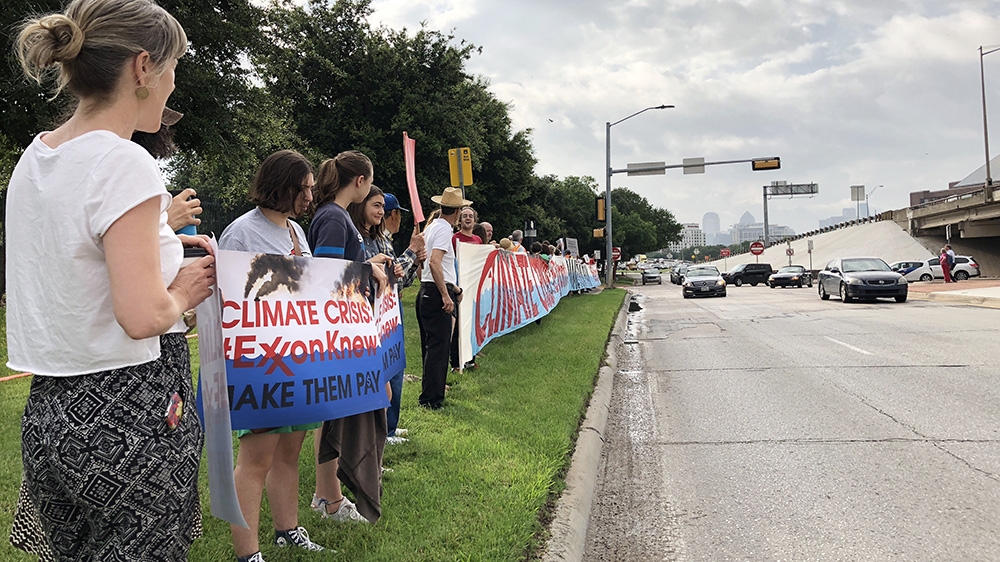‘Watershed moment’: BlackRock pledges tough stance on climate
After activists ramp up pressure, world’s biggest investment manager moves to reallocate capital away from fossil fuels.

BlackRock Chief Executive Larry Fink has demanded that corporate boards enhance efforts to address the climate crisis, marking a major transition for the globe’s largest investment manager.
In his annual letter to CEOs posted on the BlackRock website on Tuesday, Fink describes a “fundamental reshaping of finance” – following years of pressure by activists unhappy about the company’s role in bankrolling fossil fuels.
Keep reading
list of 4 itemsAs US inflation ticks back up, it could impact the presidential election
Will the US unemployment rate continue at historic lows?
The UK’s new minimum wage ‘badly needed’ but many calling for more
Fink said firms in the United States and beyond should act now or face the wrath of investors angry about how unsustainable business practices could take a bite out of their wealth. He wrote that BlackRock would “be increasingly disposed” to cast critical proxy votes tied to sustainability.
Eli Kasargod-Staub, executive director of the corporate governance watchdog group Majority Action, called the statement a “watershed moment” and said “advocates have for years been calling on BlackRock to improve its transparency on proxy voting”.
Collectively with fellow asset managers State Street Corporation and the Vanguard Group, BlackRock holds about 25 percent of shares across the S&P 500, giving these firms the ability to set rules by how they vote.
“Leading investors realise the risks of climate change are being exacerbated by high-emitting companies, through their own capital expenditures, operations and policy,” Kasargod-Staub told Al Jazeera.
Calling for corporations to “set targets aligned with the Paris Agreement”, Kasargod-Staub said “net-zero carbon emissions” should be embraced through “trade associations, lobbying and political contributions”.
“BlackRock needs to draw a clear, bright line for portfolio companies,” he added, referring to the energy, electricity and transportation sectors.
‘Beginning to crack’
Fink said in a separate letter to clients that the New York-based firm will sell off from its actively managed client portfolios all stakes in companies that derive more than 25 percent of their revenue from thermal coal production, achieving this goal by the summer of 2020.
BlackRock did not give specific details on which companies it would be divesting, or the size of those positions. At BlackRock and other investment firms, asset managers have clients with a wide range of political views and are careful to represent their actions in terms of investment strategy rather than politics.
Climate activists are praising Fink’s stronger stances, though some say the asset manager will need to back up the new rhetoric.

“BlackRock is beginning to crack, that’s an enormous deal,” said Pete Sikora, climate and inequality campaigns director at New York Communities for Change.
“They control about $7 trillion in assets – eight to 11 percent of every Fortune 500 company,” Sikora told Al Jazeera. “[They are] the single biggest owner of basically every financial asset out there, and that includes fossil fuels.”
He hailed BlackRock’s shift toward holding every board of directors accountable on climate, but also said the company still should “rearrange their passive indexes so that the defaults exclude oil, gas and coal”.
Sikora said Fink’s gesture “did not come out of thin air” but was the result of “smart, relentless activism”.
“Right now Australia is on fire, there’s enormous flooding in Indonesia, and last weekend it was 68 degrees [20 degrees Celsius] in New York,” he added. “BlackRock is part of what is torching the world.”
‘Looking at this very closely’
Top index fund managers rarely challenge company management and generally oppose climate resolutions.
At ExxonMobil’s annual meeting on May 29, BlackRock backed all but one of 10 directors up for election – but opposed six of seven shareholder proposals.
Historically, BlackRock has said it engages executives behind the scenes, an approach that critics say does not really move the needle.
Banks also have faced pressure to trim fossil-fuel financing, and activists are challenging insurance companies not to cover projects in sectors with stranded asset risk.

Meanwhile, investors have started to put more money into more climate-friendly funds. Investments in sustainable exchange-traded funds grew to $20bn in 2019, nearly four times the previous year’s record.
Ben Cushing, a campaign representative at Sierra Club, told Al Jazeera that BlackRock also should address deforestation, “which behind fossil fuels is the second-leading driver of the climate crisis”.
He said that “Larry Fink’s highly anticipated annual letter in 2019 failed to even mention climate change”.
“[BlackRock] peers and competitors are going to be looking at this very closely” in 2020, Cushing added.
“At annual shareholder meetings this spring,” said Cushing, “BlackRock has a near-term opportunity to implement these words and put them into action.”